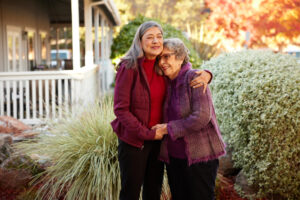Healthy eating for seniors is more than just a lifestyle choice, it’s a vital component of aging gracefully and maintaining your overall well-being. As we age, our nutritional needs evolve and it’s important to adjust our diets to support these changes. A well-balanced diet helps address slower metabolism, dietary changes, and the body’s increased need for specific nutrients. Incorporating healthy foods can help reduce the risk of chronic conditions like heart disease, diabetes, and high blood pressure.
Why Healthy Eating for Seniors is Different
At the age of 60, the body’s metabolism begins to slow down, resulting in a need for fewer calories. Additionally, we tend to engage in less physical activity and experience a loss of bone and muscle mass. Despite this, the body often requires more nutrients, making it essential to follow a diet rich in vitamins and minerals Things like chronic health conditions, taking multiple medications, and changes in body composition make it even more essential to follow a healthy diet.
Nutrients Needed for Senior Adults and Why
Seniors require specific nutrients that are essential to maintain health and vitality such as:
- Calcium: Supports strong bones and teeth
- Fiber: Aids digestion, regulates blood sugar, manages cholesterol, and promotes healthy weight
- Potassium: Helps regulate blood pressure
- Protein: Maintains muscle mass
- Vitamin D: Supports bone health
- Vitamin B12– Supports red blood cell production, DNA creation, and nerve function.
To incorporate these nutrients into your daily diet, focus on building balanced meals. The U.S. Department of Agriculture’s (USDA) MyPlate graphic is a helpful guide, illustrating how to proportionally include the five food groups on your plate. In general, it is important to focus on eating a variety of foods. Think of your plate as a rainbow and try to incorporate multiple bright-colored foods in each meal.
What Should Your Plate Look Like?
A good rule of thumb is to prioritize foods that are high in fiber and low in sodium. A healthy meal should include lean protein, fruits and vegetables, whole grains, and low-fat dairy. Aim for whole foods options like fresh produce, lean meats, and brown rice or quinoa. Avoid heavily processed foods, such as chips and pastries. If you are unsure if a food is heavily processed, check the Nutrition Facts label and look for natural ingredients and low fat, added sugar, and sodium. General healthy eating tips for seniors include:
- Drink plenty of liquids: think coffee, tea, water, milk, and 100% juice
- Limit salt intake: try substituting salt for dried herbs and spices to add flavor
- Use recommended serving sizes
Practical Tips for a Healthy Diet for Seniors
Making small, practical adjustments can significantly help seniors maintain a healthy diet. Start by planning meals with nutrient-dense ingredients that support overall well-being. For example, preparing soups loaded with vegetables, beans, and lean proteins is an excellent way to ensure meals are rich in fiber and calcium throughout the week. Loading the pantry and freezer with staples like whole-grain pasta, low-sodium canned vegetables, and frozen fruits ensures that healthy snacks and quick, nutritious meals are always within reach. Socializing through cooking together or participating in meal-sharing programs can further enhance the experience, helping to combat feelings of isolation while promoting better eating habits. By focusing on accessibility, variety, and enjoyment, seniors can create a diet that supports long-term well-being.
The Importance of Staying Hydrated as a Senior
Staying hydrated is especially important as we age since dehydration becomes more common in older adults. This happens because thirst levels naturally drop, body composition changes, and certain medications, like diuretics, can cause fluid loss. Drinking enough water can make a big difference by keeping your brain sharp, boosting your mood, and helping with digestion. Drinking a few extra glasses of water each day can improve memory, boost digestion, and even help you feel more energized.
Hydration also helps with everyday aches and pains, such as stiff joints, by keeping them cushioned and well-lubricated. It also benefits your kidneys, helping to flush out waste and prevent kidney stones. Additionally, staying hydrated can make it easier to handle hot weather by helping your body cool down more effectively.
Common Challenges to Senior Nutrition
As we age, we often encounter challenges that can prevent us from proper nutrition. Physical changes, such as decreased appetite due to altered taste and smell, can make eating less enjoyable, leading to a reduced food intake. Additionally, difficulties in chewing or swallowing often resulting from dental issues or conditions like dysphagia, can limit the types of foods seniors can eat and potentially lead to nutrient deficiencies. Cognitive impairments, such as dementia, may make it more difficult to stick to a balanced diet.
Social factors can also play a significant role in seniors consuming their much-needed nutrients. Feelings of loneliness and social isolation can decrease motivation to eat regular meals, increasing the risk of malnutrition. Economic constraints, like fixed or limited incomes, may force older adults to choose cheaper, less nutritious food options, compromising their diet. Limited access to transportation can exacerbate these issues by reducing trips to grocery stores and thereby reducing the availability of fresh and healthy foods.
To address these challenges, seniors need to receive regular health assessments, social support, and community resources to ensure they maintain sufficient nutrition for their overall health and well-being.
The Cogir Senior Living Difference
At Cogir Senior Living, we understand that choosing a senior living community represents an important life decision. Our communities offer the perfect combination of comfort and value, helping residents enjoy an engaging lifestyle while making the most of their resources. From premium accommodations and professional care teams to engaging activities and fine dining experiences, we focus on creating an environment where residents thrive.
We know what a nutritionally balanced diet for the elderly looks like. To stay on top of the dietary needs of our residents, each Cogir community has a team of chefs that offer three nutritionist-approved, globally-inspired meals each day. Sample dishes include: grilled shrimp greek salad, salmon burger, homestyle chicken pot pie, roast beef with roasted carrots and garlic mashed potatoes, and fresh soups.
By embracing these healthy eating habits, seniors can look forward to a healthier, more fulfilling lifestyle one meal at a time.


